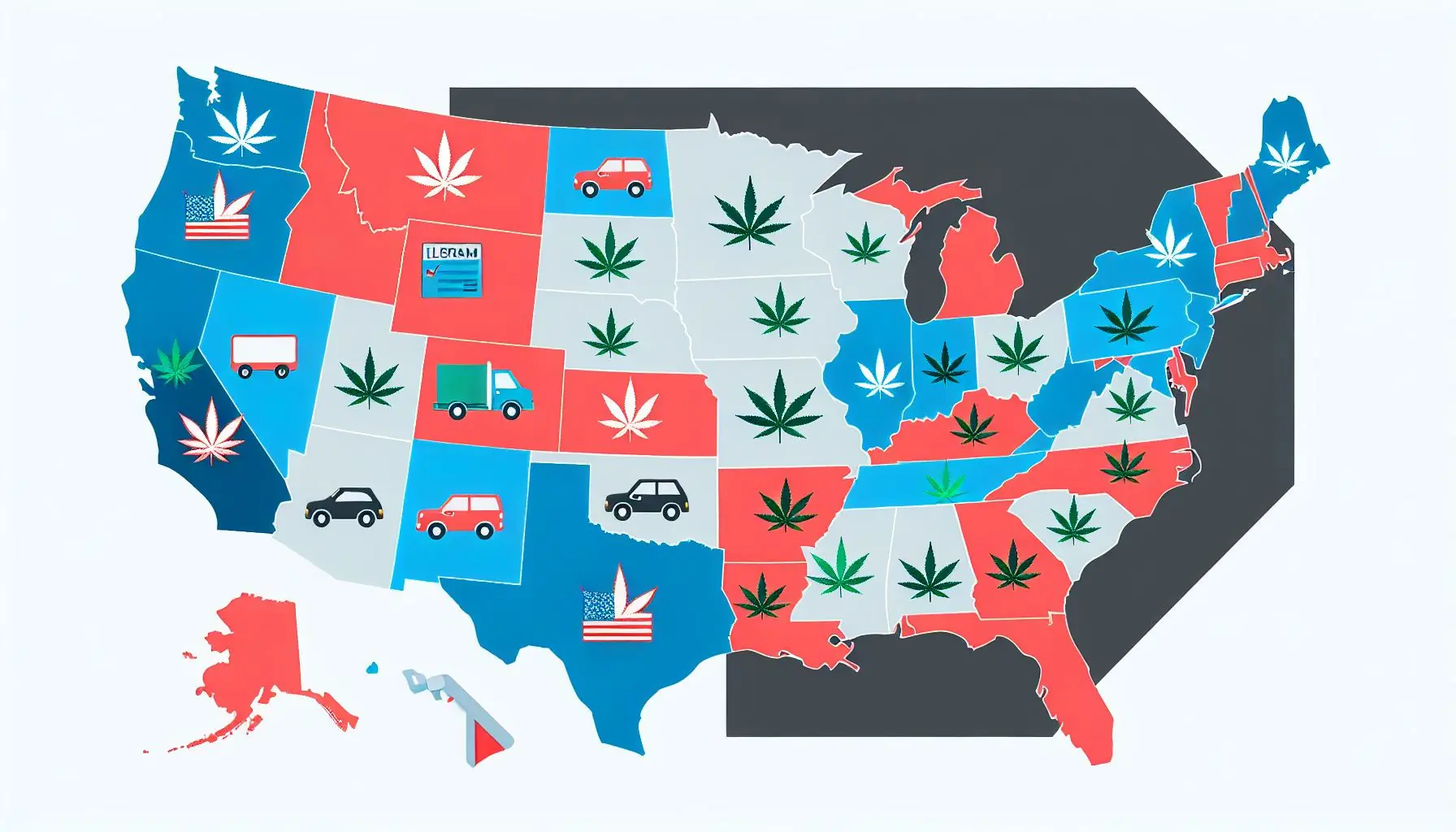Table of Contents
ToggleNavigating the open road can be a thrilling adventure, especially when you rely on medical marijuana for your well-being. But is hitting the highway while carrying your medical cannabis essential oils and edibles a legal green light? Many drivers find themselves pondering this very question.
With varying laws across states and the ever-evolving legal landscape, understanding the dos and don’ts of traveling with medical marijuana is crucial. From transportation tips to legal considerations, staying informed ensures your journey remains smooth and stress-free.
Embark on your road trip with confidence by uncovering the facts about traveling by car with medical marijuana. Whether you’re a seasoned traveler or planning your first medical cannabis-fueled drive, this guide has you covered.
Legal Considerations
Understanding the legal landscape is crucial when traveling with medical marijuana. Compliance with laws ensures a safe and hassle-free journey.
Federal vs State Laws
Federal law classifies marijuana as a Schedule I controlled substance, making its possession illegal nationwide. Despite this, many states have legalized medical marijuana, creating a conflict between state and federal regulations. In states where medical cannabis is permitted, patients must possess a valid medical marijuana card. However, federal authorities can still enforce federal laws, potentially leading to legal complications. States like California, Colorado, and New York have established comprehensive medical cannabis programs, each with specific regulations. Travelers must recognize that possessing medical marijuana in a state where it is legal does not grant immunity under federal law. Additionally, smoking marijuana in public places remains prohibited in most states, even if medical use is allowed. Staying informed about both federal and state laws helps mitigate legal risks during travel.
Interstate Travel Restrictions
Traveling across state lines with medical marijuana introduces additional legal challenges. Federal law prohibits the transportation of marijuana between states, regardless of each state’s local laws. Possessing medical cannabis while crossing state borders can result in federal charges, including fines and imprisonment. States like Texas and Florida have strict anti-marijuana laws, and carrying medical marijuana into these states can lead to severe penalties. Even within states that permit medical use, drivers must ensure that their cannabis products are stored securely and are not accessible while operating a vehicle. Air travel remains particularly risky, as transporting marijuana on airplanes is subject to stringent federal regulations and TSA protocols. To avoid legal issues, travelers should plan their routes carefully and verify the laws of each state they intend to visit.
State-Specific Regulations

Understanding state-specific regulations is essential for traveling with medical marijuana. Each state has unique laws that govern the possession, transportation, and use of medical cannabis.
States Where It’s Allowed
California permits medical marijuana travelers to carry up to 8 ounces of usable marijuana. Colorado allows transportation within state lines with a valid medical card. Oregon requires patients to keep cannabis products in their original packaging while driving. Nevada supports medical marijuana transport, provided it remains in a secure container. Florida allows patients to carry limited amounts when traveling within the state. Arizona permits transportation for registered patients, ensuring products are stored safely. These states have established clear guidelines, facilitating easier travel for medical marijuana users.
States With Strict Prohibitions
Texas enforces strict penalties against transporting marijuana, even for medical use. Idaho maintains a zero-tolerance policy, with no allowances for medical cannabis. Nebraska prohibits possession and transportation, imposing severe legal consequences. South Dakota restricts medical marijuana transport outside its regulated system. Kansas does not recognize medical marijuana, making transport illegal. Utah enforces stringent laws against possession and movement of cannabis products. These states impose heavy restrictions, increasing the risks for travelers with medical marijuana.
Safe Transportation Practices
Ensuring the safe transportation of medical marijuana requires adherence to specific guidelines. Proper handling minimizes legal risks and maintains product integrity during travel.
Proper Storage Methods
Medical marijuana must remain secure and out of sight while traveling. Store products in airtight, odor-proof containers to preserve potency and prevent leakage. Keep them in the vehicle’s glove compartment or a locked trunk to avoid easy access. Avoid leaving cannabis in extreme temperatures, as heat or cold can degrade its quality. Utilize child-resistant packaging to comply with legal requirements and ensure safety. Clearly label containers with medical marijuana identification to demonstrate legitimate use if inspected. Regularly check storage conditions to maintain product efficacy throughout the journey.
Dosage and Usage Guidelines
Adhering to recommended dosage ensures effective symptom management without impairing driver abilities. Patients should follow their prescribed regimen strictly, adjusting only under medical supervision. Avoid using medical marijuana while driving to comply with safety regulations and prevent impairment. Plan consumption times to maintain control over dosage levels during travel. Keep dosage information accessible to reference acceptable limits. Educate travelers on potential side effects that could affect driving performance, such as drowsiness or altered perception. Prioritize safe usage practices to uphold both legal standards and personal health needs during transportation.
Potential Risks and Penalties
Legal Consequences
Violation of marijuana transportation laws attracts severe penalties. Individuals caught crossing state lines with medical marijuana might face hefty fines, ranging from $1,000 to $10,000, depending on the state. Additionally, possession without proper documentation can result in imprisonment for up to one year. Drivers may encounter license suspensions, hindering their ability to travel legally in the future. Federal charges apply when transporting cannabis across state borders, regardless of state-specific allowances. Moreover, repeated offenses escalate penalties, potentially leading to longer incarceration periods and increased fines. Courts often impose mandatory drug education or rehabilitation programs for offenders. Confiscation of the medical marijuana products is another consequence, disrupting treatment regimens. Legal records from these violations can impact future employment and housing opportunities. Understanding these repercussions is crucial for patients to avoid inadvertent legal complications while traveling.
Implications for Travelers
Travelers with medical marijuana encounter multiple challenges impacting their journeys. Border crossings become high-risk areas where inspections are stringent, increasing the likelihood of seizures. Airports enforce federal regulations, prohibiting cannabis regardless of medical status, which can lead to denied boarding or fines. Insurance coverage may be affected if legal issues arise, complicating claims during travel disruptions. Travelers might face restricted access to accommodations that allow cannabis storage, limiting their lodging choices. Public transportation authorities typically enforce strict no-cannabis policies, reducing available travel options. Moreover, unexpected law enforcement encounters can result in delays or detentions, disrupting travel plans. Navigating varying state laws requires meticulous planning to ensure compliance, adding stress to the travel experience. These factors collectively emphasize the importance of thorough preparation and awareness for those traveling with medical marijuana.
Alternatives and Recommendations
Using Medical Marijuana Delivery Services
Delivery services present a secure alternative to transporting medical marijuana by car. Many states with medical cannabis programs authorize licensed providers to offer home delivery. These services ensure patients receive their medication without the legal risks of transporting cannabis personally. Additionally, delivery options operate within state regulations, reducing the likelihood of legal complications. Patients can schedule deliveries to match their travel itineraries, maintaining uninterrupted access to their medication. Utilizing delivery services also minimizes exposure to law enforcement checks during travel. By choosing reputable providers, patients ensure the quality and safety of their medical marijuana. This approach simplifies the process, allowing travelers to focus on their journey without worrying about transportation concerns.
Consulting Legal Experts
Legal experts offer crucial assistance for navigating the complexities of traveling with medical marijuana. They clarify the differences between state and federal laws, ensuring compliance throughout the trip. Attorneys provide personalized advice based on individual circumstances, helping patients understand their rights and responsibilities. Consulting a legal professional reduces the risk of inadvertently violating laws, especially when crossing state lines. Experts stay updated on the latest regulations, offering accurate and reliable information. They can also represent patients in case of legal issues, providing peace of mind during travel. By seeking legal counsel, travelers make informed decisions that safeguard their legal standing and ensure a smooth journey with medical marijuana.
Traveling by car with medical marijuana requires careful planning and a solid understanding of the legal landscape. Staying informed about state regulations and ensuring that all products are securely stored can help avoid potential issues on the road. Choosing safe transportation methods and knowing your rights are essential for a smooth journey. Exploring alternatives like delivery services offers additional flexibility and minimizes legal risks. By taking these precautions, medical marijuana users can confidently manage their health needs while enjoying their travels without unnecessary stress.




